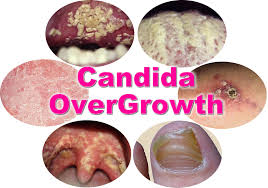
Candidiasis Over Growth
How to treat Candidiasis (Yeast And Thrush Infection)
Candidiasis is the medical name for a overgrowth of candida or yeast. Most people call this yeast or thrush. Candida albicans is one f the many types of fungi. This fungi lives and grows inside our bodies. Our bodies have probiotics that is friendly bacteria as well as immune cells to help fight the fungi and prevent it from being a problem. However, some things can cause an over growth yeast or candidiasis in the body such as medication, to much junk food or sugar and allergies. These things diminish the amount of friendly bacteria we have in the body which allows candida or yeast to grow without be checked or balanced.
You can identify yeast by the soft white patches in the oral cavity located on the skin or around the anus. Most of the time people that have a comprised immune system, babies and the elderly have a problem with candida. Also, people that have AIDS or being treated with chemotherapy have problems with candida. Anyone that has a autoimmune problem with have problem with cadidiasis. People with a weak immune system can experience serious problems from the overgrowth of yeast. They yeast can be deadly to them because it can poison the blood.
Women often suffer from vaginal yeast infections. Most of the time they will know they have a yeast infection because they will experience itching, burning and soreness around the vagina. Also, they will have a sticky, thick discharge. Women normally experience this problem because they have a poor diet, eat to much junk food, over use of antibiotics and hormone imbalance.
Signes Of Candidiasis
Signs Of Yeast Infection
- Thick Yellow Discharge
- Burning During Urination
- Vaginal Itching
- Pain And Burning
Signs Of Thrush
- Bad Breath
- Mouth Dry
- Heavily Coated Tongue
- White Patches On Side Of Mouth
- Inflammed Red Patches On The Skin
Symptoms Of Systematic Candidiasis : diarrhea, muscle pain, colitis, arthritis, abdominal pain canker sores, congestion, headaches, cough, chronic skin rashes allergies, blood sugar imbalances, numbness or tingling in limbs, persistent fatigue, rectal itching, constipation, kidney and bladder infection.
What Causes Candidiasis:
- Prolonged or frequent use of antibiotics or corticosteroids (deletes good bacteria)
- Depressed immune system
- High sugar diet
- Aging
- Mercury toxicity
- Allergies
- Stress
- Birth control pill
- Hormonal changes
- Poor digestion
- Constipation
- Poor immune system
Treating Candidiasis Overgrowth
Treating Candidiasis
Eat whole foods that will boost the immune system. Eat a lot of vegetables, fruits, whole grains, beans, lentils, lean meats, and fish. Drink plenty of water. Eat unsweetened live yogurt cultures. You can also consume 1 to 2 tabelspoons of ground flaxseeds daily. Flaxseeds have antifungal properties.
Avoid Foods Such As junk food, foods high in yeast or sugar, alcohol, foods with mold such as cheese, nuts and nut butters. Limit fruits and fruit juices
Herbs For Treatement: Grapefruit seed extract, Gentian root, Caprylic acid, Echinacea, Garlic, Probiotics, Oregano
Top of Form
